Excellent although necessarily 'long' article that asks many good questions and has some excellent proposals for action.
Regardless of how you might feel about hybrids or GM et al - strongly suggest you read it.
http://www.glgroup.com/News/Is-Toyotas-Prius-Being-Dumped-On-The-US-Market--23242.html
April 3, 2008
Is Toyota's Prius Being Dumped On The US Market?
Analysis By: Jack Lifton
Jack Lifton
Chief Executive Officer , Jack Lifton, LLC
INTRO / Implications: / Background
Regardless of how you might feel about hybrids or GM et al - strongly suggest you read it.
http://www.glgroup.com/News/Is-Toyotas-Prius-Being-Dumped-On-The-US-Market--23242.html
April 3, 2008
Is Toyota's Prius Being Dumped On The US Market?
Analysis By:
 Jack Lifton
Jack Lifton Chief Executive Officer , Jack Lifton, LLC
INTRO / Implications: / Background
PROBLEM DEFINITION / Analysis:
ACTIONABLE OPTIONS / HOW TO CORRECT
KEY QUESTION :






